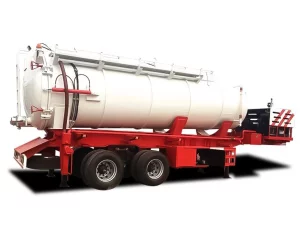Monday to Saturday - 8:00 -17:30
Everything You Need to Know About Small Refrigerator Trucks
If you’re in the transport business or seeking ways to improve your logistics, you might be contemplating using a small refrigerator truck. These versatile vehicles are essential for transporting perishable goods, ensuring they arrive safely and fresh. In this article, we will delve into the ins and outs of small refrigerator trucks, from their features to their applications and benefits.
What Is a Small Refrigerator Truck?
A small refrigerator truck, also known as a reefer truck, is specifically designed to transport temperature-sensitive goods. These trucks come equipped with a refrigeration unit that maintains a controlled environment inside the cargo area. They are commonly used in the food industry, pharmaceuticals, and other sectors that require strict temperature control.
Features of Small Refrigerator Trucks
Small refrigerator trucks have several defining features that make them ideal for transporting perishable products. Here are some of the critical features:
- Insulated Cargo Area: The walls and ceiling of the cargo area are well-insulated to retain cold air.
- Refrigeration System: A built-in refrigerated unit that can be adjusted to meet specific temperature requirements.
- Temperature Monitoring: Many modern trucks are equipped with digital temperature monitoring systems.
- Size Variations: Available in various sizes to accommodate different volumes of goods.
Why Use a Small Refrigerator Truck?
Using a small refrigerator truck can have numerous advantages, especially for businesses that deal with perishable goods. Here are some notable benefits:
1. Enhanced Food Safety
Food safety regulations are becoming more stringent. Refrigerated transport minimizes the risk of spoilage and helps maintain quality, thereby ensuring compliance with health regulations.
2. Versatility
Small refrigerator trucks are versatile and can be used for various applications, including:
- Food delivery services
- Grocery stores
- Restaurants
- Florists
- Pharmaceuticals
3. Reduced Waste
Using a small refrigerator truck can significantly reduce food waste. By maintaining the proper temperature, products can be delivered in optimal condition, which leads to higher customer satisfaction and less spoilage.
Choosing the Right Small Refrigerator Truck
When selecting a small refrigerator truck, various factors should be considered to ensure it meets your specific needs. Here are some key points to keep in mind:
1. Evaluate Your Cargo Needs
Consider the types of goods you will be transporting. Different products may require different temperature settings.
2. Size and Capacity
| Size | Cargo Capacity (Cubic Feet) | Ideal Uses |
|---|---|---|
| Small (10-15 ft) | 500-1,200 | Small deliveries, restaurant supplies |
| Medium (15-20 ft) | 1,200-2,000 | Grocery store deliveries |
| Large (20+ ft) | 2,000+ | Wholesale supplying |
3. Fuel Efficiency
Look for models that are built for fuel efficiency. This will lower operational costs and reduce your carbon footprint.
4. Maintenance Requirements
Research the maintenance requirements of different models to avoid unexpected downtime and expenses.
How to Maintain Small Refrigerator Trucks
Proper maintenance is crucial for ensuring that your small refrigerator truck operates efficiently. Consider the following maintenance tips:
1. Regular Inspections
Conduct regular inspections on the refrigeration unit and cargo area to identify potential issues before they escalate.
2. Clean the Unit
Keep the refrigeration unit clean to ensure optimal performance. Accumulated dirt can affect its efficiency.
3. Check Seals and Insulation
Inspect the insulation and seals in the cargo area to prevent cold air from escaping and maintain the desired temperature.
Real-Life Applications of Small Refrigerator Trucks
Small refrigerator trucks play a crucial role in various industries. Here are some real-life applications:
1. Grocery Delivery Services
A grocery store can use a small refrigerator truck to deliver fresh produce, dairy products, and meat to customers while ensuring they remain at the proper temperature. This minimizes spoilage and maximizes customer satisfaction.
2. Floral Deliveries
Florists use small refrigerator trucks to transport flowers. Maintaining a cooler temperature can prolong the life of the flowers and ensure they arrive in excellent condition.
3. Medical Supplies Transport
Pharmaceutical companies rely on refrigerator trucks to transport medication that requires specific temperature controls, thus ensuring efficacy on arrival at distribution centers or hospitals.
Cost Considerations for Small Refrigerator Trucks
When investing in a small refrigerator truck, it is essential to consider the overall costs. Here’s a breakdown of what to expect:
1. Purchase Price
The initial cost of a new small refrigerator truck can range from $25,000 to $70,000, depending on size and specifications. Used trucks may offer more affordability but could come with maintenance challenges.
2. Fuel Costs
Fuel expenses will vary based on the truck’s fuel efficiency and the distance traveled. Monitoring fuel consumption can offer insights into optimizing routes and reducing costs.
3. Maintenance and Repairs
Regular maintenance is crucial for preserving the efficiency and longevity of the truck. Budgeting for annual upkeep and unexpected repairs is essential.
4. Insurance
Insurance is another cost to consider. Rates will depend on the value of the truck, your driving history, and the type of goods transported.
Tips for Operating a Small Refrigerator Truck Effectively
To maximize the benefits of using a small refrigerator truck, consider the following operational tips:
1. Monitoring Temperature
Utilize digital temperature monitors to ensure your cargo remains at the right temperature throughout transport. Real-time monitoring can help in making instant adjustments.
2. Optimizing Load Capacity
Avoid exceeding the truck’s capacity. Overloading can reduce efficiency and lead to potential damage to perishable goods.
3. Route Planning
Plan routes that minimize distance and potential barriers. This will reduce fuel consumption and ensure quicker deliveries.
4. Training Staff
Ensure all staff involved in operating or loading the truck are adequately trained in best practices for handling perishable goods and maintaining the refrigeration unit.
Frequently Asked Questions (FAQ)
1. What is the temperature range for a small refrigerator truck?
Small refrigerator trucks typically operate within a temperature range of 0°F to 70°F, depending on the cargo requirements. For frozen goods, the temperature setting is generally around -10°F to 0°F.
2. Can small refrigerator trucks be used for non-food items?
Yes, small refrigerator trucks can be used for non-food items, such as pharmaceuticals and flowers that require temperature control, ensuring they remain fresh and effective during transportation.
3. How much does it cost to maintain a small refrigerator truck?
The cost of maintenance varies greatly but could average between $1,000 to $5,000 annually, depending on the truck’s age and condition, as well as usage frequency.
4. Are there financing options for purchasing small refrigerator trucks?
Various financing options are available, ranging from traditional bank loans to leasing arrangements, depending on financial needs and credit profiles.
5. How can I improve the fuel efficiency of my small refrigerator truck?
To improve fuel efficiency, keep the truck well-maintained, avoid overloading, plan efficient routes, and consider utilizing a newer model with better fuel economy ratings.
6. What are the safety regulations for transporting perishable goods?
Safety regulations vary by region but generally require compliance with local health and safety guidelines, including proper temperature control, hygiene standards, and the use of adequate packaging materials.









